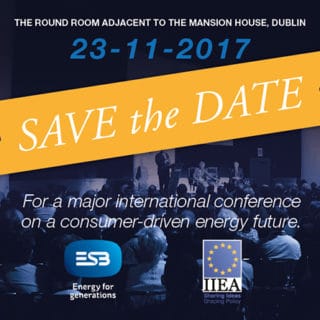Take Charge! – Together Towards a Low Carbon Future

Today, we are at the cusp of a transition towards a secure, sustainable and low-carbon energy future, which requires a rethinking of the relationship between utilities and consumers. Traditionally, the consumer was a passive participant in the energy equation; now, over a century later, energy providers are seeking new ways to engage with consumers in order to realise their vision of a new energy future.
This transformation of the energy sector is fuelled by the rapid speed of innovation and the pace of emerging digital technologies and policymakers, too, have recognised it as a vital element in achieving important climate change mitigation objectives. This transition cannot be achieved solely through top-down changes, however. The challenge for utilities is to transform the consumer into an active and “energy literate” citizen, who is centrally involved at every stage of the process.
A forthcoming major IIEA/ESB conference on 23 November 2017 will give an overview of this exciting development and bring together policymakers, industry experts and thought leaders from the United States, Europe and Ireland to explore all angles of this “pivot towards the consumer”.
We hope that you will join us in exploring what’s in store for you in Ireland’s energy future and how you can share in making it a reality. To register your interest, and to be kept informed of additions to the programme, email [email protected].
The Global Energy Sector in Transition
The global energy sector is in a phase of unprecedented transition, especially since the conclusion of the Paris Agreement in December 2015, where 195 countries agreed to significantly curb emissions to mitigate the effects of climate change. Three key steps to achieving this goal are:
- the decarbonisation of the energy sector through the deployment of renewable energies;
- the electrification of heating and transport; and
- a step-up in energy efficiency measures
An overhaul of the traditional vertical hierarchy in the energy industry and the empowerment of the consumer are seen as vital steps not just in decarbonising the energy sector, but also in rendering it secure, equitable and competitive. This is also reflected in the ambitious goals of the EU’s Energy Union.
The EU wishes to retain its leadership role in climate change. This is evident in the European Commission’s Clean Energy for All Europeans Package (November 2016), a set of legislative proposals designed to achieve the EU’s 2030 climate and energy goals. They include: more flexible energy markets, expanded energy consumers’ rights, and legislation designed to increase the energy efficiency of buildings and the uptake of electrification of heat and transport. They also have the clear objective of putting active, informed “energy citizens” at the heart of the energy transition.
Ireland has tremendous potential for renewable energy generation and for the widespread development of energy efficiency measures. In the context of Brexit, Ireland’s location at the periphery of the EU lends a particular urgency to stepping up the speed of the energy transition at home. Here, too, consumers will have a pivotal role in creating a sustainable, low-carbon and more energy-independent Ireland.
Putting the Power in Consumers’ Hands
Following through on these ambitious European policies will rely on fully leveraging the advantages of advances in digital technology and generating energy literacy across generations and across the country.
Two key trends - the spread of low-carbon, energy-efficient generation and storage; and the power of big data and the internet of things - are already shaping the energy future. The use of behavioural demand response (BDR) software will allow the consumer to take charge of the way they use energy in their everyday lives and achieve significant energy efficiency savings. Smart grids will lead to smart homes and smart cities and a two-way engagement between consumers and energy providers.
Building an Inclusive Transition
The new generation of millennial energy consumers already expects to use apps on their smartphones to deal with all their energy needs. But policy and technology advances can only be effective if everyone becomes part of the energy transition. This is why an inclusive approach to societal integration of smart and consumer-empowering technologies is vital.
Consumers, utilities, policymakers and other stakeholders must become truly “energy literate”. Energy providers, in particular, will play a key role in this process by analysing and understanding the complex needs and expectations of today’s consumers and communicating the advantages of smart technologies to them, so that the power is literally in consumers’ hands.
Towards a Consumer-Driven Energy Future
On 23 November 2017, the Institute of International and European Affairs, together with ESB, Ireland’s largest energy provider, will host a major energy conference at the Round Room adjacent to the Mansion House to explore all angles of this all-important transition towards a consumer-centric, sustainable, secure and low carbon energy future.
Participants will leave with a clear picture of the technologies that will shape tomorrow’s energy sector, as well as how they, individually, can take charge of their own energy futures. Policymakers, industry experts and thought-leaders from the United States, Europe and Ireland will join us for this unique event.
We hope that you, too, will join us in this immersive experience and see how together, we can make Ireland’s energy future a bright one.
Max Muenchmeyer
As an independent forum, the Institute does not express any opinions of its own. The views expressed in the article are the sole responsibility of the author.
